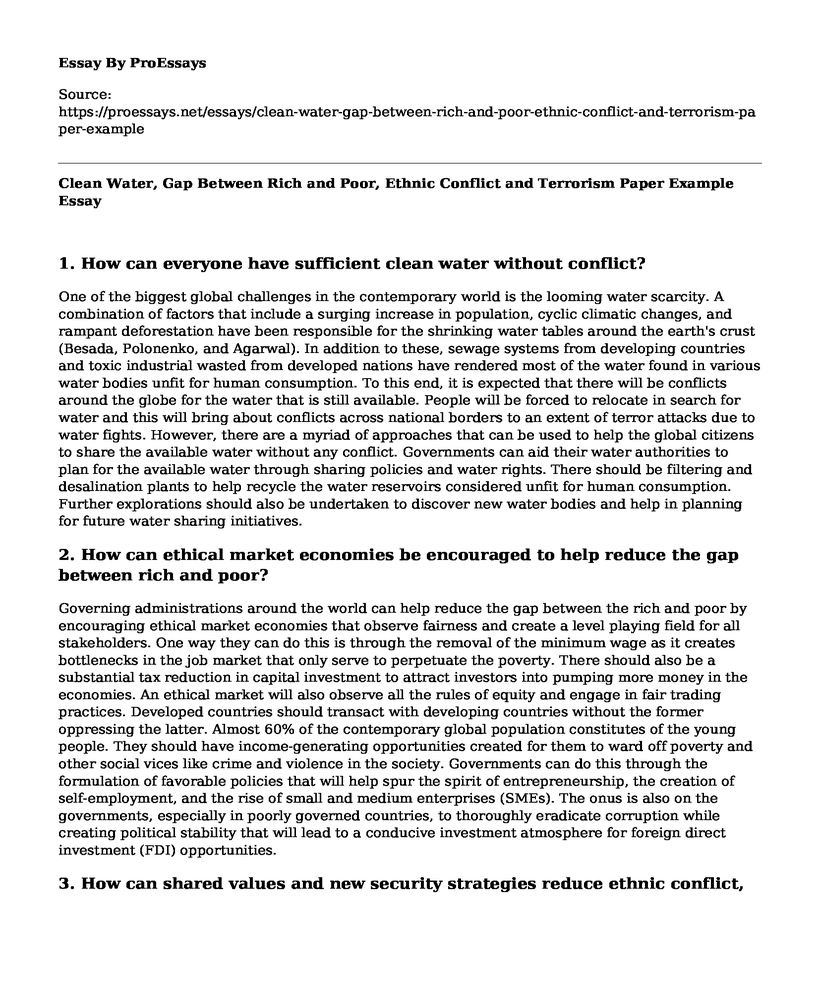1. How can everyone have sufficient clean water without conflict?
One of the biggest global challenges in the contemporary world is the looming water scarcity. A combination of factors that include a surging increase in population, cyclic climatic changes, and rampant deforestation have been responsible for the shrinking water tables around the earth's crust (Besada, Polonenko, and Agarwal). In addition to these, sewage systems from developing countries and toxic industrial wasted from developed nations have rendered most of the water found in various water bodies unfit for human consumption. To this end, it is expected that there will be conflicts around the globe for the water that is still available. People will be forced to relocate in search for water and this will bring about conflicts across national borders to an extent of terror attacks due to water fights. However, there are a myriad of approaches that can be used to help the global citizens to share the available water without any conflict. Governments can aid their water authorities to plan for the available water through sharing policies and water rights. There should be filtering and desalination plants to help recycle the water reservoirs considered unfit for human consumption. Further explorations should also be undertaken to discover new water bodies and help in planning for future water sharing initiatives.
2. How can ethical market economies be encouraged to help reduce the gap between rich and poor?
Governing administrations around the world can help reduce the gap between the rich and poor by encouraging ethical market economies that observe fairness and create a level playing field for all stakeholders. One way they can do this is through the removal of the minimum wage as it creates bottlenecks in the job market that only serve to perpetuate the poverty. There should also be a substantial tax reduction in capital investment to attract investors into pumping more money in the economies. An ethical market will also observe all the rules of equity and engage in fair trading practices. Developed countries should transact with developing countries without the former oppressing the latter. Almost 60% of the contemporary global population constitutes of the young people. They should have income-generating opportunities created for them to ward off poverty and other social vices like crime and violence in the society. Governments can do this through the formulation of favorable policies that will help spur the spirit of entrepreneurship, the creation of self-employment, and the rise of small and medium enterprises (SMEs). The onus is also on the governments, especially in poorly governed countries, to thoroughly eradicate corruption while creating political stability that will lead to a conducive investment atmosphere for foreign direct investment (FDI) opportunities.
3. How can shared values and new security strategies reduce ethnic conflict, terrorism and the use of weapons of mass destruction?
The world of today needs to unite in shared values and concrete security strategies that will help thwart the ever growing threat of ethnic conflicts, terrorism, and weapons of mass destruction (Besada, Polonenko, and Agarwal). Powerful nations need to engage the disenfranchised groupings around the world to curb ethnic conflicts and terrorism. Chemical, nuclear, and biological weaponry is likely to advance with time and it is only logical that global communities learn to cooperate through security and education systems in a healthy manner to avoid terrorism and civil unrest. Peace scenarios ought to be established through a participatory process that will involve all other stakeholders. The media and NGOs have a role to play too by acting as an early warning system to the United Nations where they should stimulate the political goodwill to intervene whenever global terror threats are observed. Sanctions directly targeting the hardened criminals should be put in place as opposed to punishing entire populations. All the governments around the world should agree on destroying their stockpiles of chemical, nuclear, and biological weapons.
Works Cited
Besada, Hany, Leah M. M. Polonenko, and Manmohan Agarwal. Did the Millennium Development Goals Work?: Meeting Future Challenges with Past Lessons. Bristol, UK: Policy Press, 2017. Print.
Cite this page
Clean Water, Gap Between Rich and Poor, Ethnic Conflict and Terrorism Paper Example. (2022, Jul 03). Retrieved from https://proessays.net/essays/clean-water-gap-between-rich-and-poor-ethnic-conflict-and-terrorism-paper-example
If you are the original author of this essay and no longer wish to have it published on the ProEssays website, please click below to request its removal:
- Sexual Abuse Trauma Case Study
- Counter Terrorism Organizational Analysis
- Inequality in Education Annotated Bibliography
- Essay Sample on Hate Crimes: Prejudice, Targets & Bias Incidents
- Essay Sample on Wealth Inequality: A Global Menace with No Easy Solutions
- Essay Sample on Avoid Bias in Performance Appraisals: Tips & Examples
- Women in Ancient Greece & India: A Comparison - Research Paper







